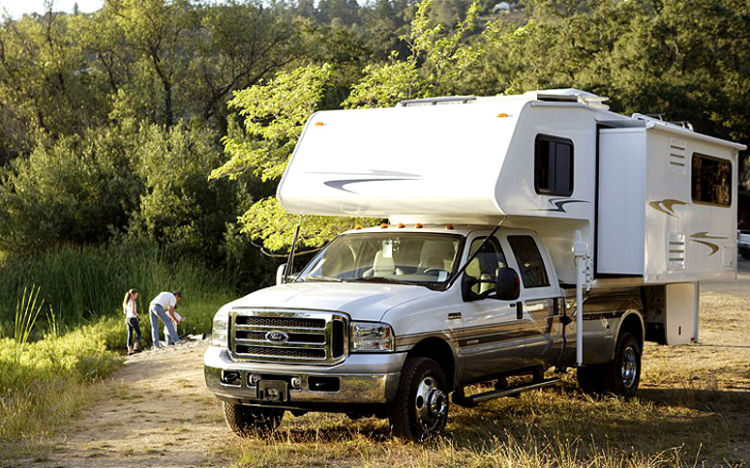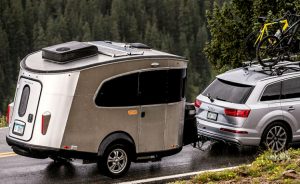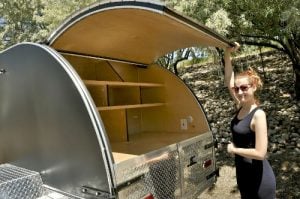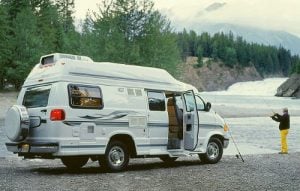Look around any full RV park and you might wonder if more Class Bs and Class Cs are on the highway these days. If so, you would be correct. Choosing smaller RVs on purpose is in vogue according to RV sales trends.

RVers of all ages are looking to simplify. Image courtesy RVIA.org
RV owners are younger than ever, somewhere between 35 and 54 years old according to the Recreational Vehicle Industry Association of America (RVIA). They’re choosing smaller RVs in large numbers not because of finances, but often because of the innovative new amenities RV manufacturers now include in smaller RVs.

The 2017 Airstream Basecamp.
For instance, just see what’s new about the Airstream Basecamp. The rear of the trailer opens up like a toy hauler for easy loading of gear, kayaks, mountain bikes or any other essentials.
Many small RVs like the Basecamp follow this trend, as noted by a USA Today article from January 2017. It reported that “the newest trend is toward lightweight trailers that can be towed behind many cars or small SUVs, opening up RV travel to a new generation.”

Photo courtesy Colorado Tear Drop Trailers.
Even NADA Guides 2016 Q3 RVs Market Report confirms that small RVs are more popular than ever.
NADA experts say there’s “a trending shift away from purchasing large units to the smaller trailers. We have seen this trend with baby boomers gradually downsizing from large Class A units to smaller Class C and Class B motorhomes. Millennials also tend to gravitate towards the smaller trailers.”
“We also wanted to get back to some of the smaller campgrounds we used to enjoy. So two weeks ago we traded it for an Itasca Navion 24J on the Mercedes Sprinter chassis. What a dream to drive. Plenty of power going up the mountains and 15+ mpg so far.” – iRV2 Forums Member Camper Ken
Smaller RVs have enough advantages to make them more popular than ever. Although retail costs of a downsized RV like a Class B can rank up there with that of a good used diesel pusher, the common pros of choosing smaller RVs are too good to pass up for many owners.
Pros of smaller RVs
- Better gas mileage
- Dry camping access
- Lower insurance costs
- Easier city driving
- Lower cost of ownership
Although there are many pros of downsizing, owners cite many common downsides.

RVers of all ages are looking to simplify. Image: RVIA.org
Cons of smaller RVs
- Small holding tanks
- Louder engine noise (in Class Cs)
- Smaller bathroom/showering space
- Less payload capacity
“Passing each other can be challenging if done often, but you learn to have one person doing stuff up front, and another in the rear until you both want to switch. Or, one makes bed while the other preps breakfast. We only shower in the vehicle when no other alternative is available…” – iRV2 Forums Member Rubix cube
If you’re considering a smaller RV, the best thing you can do is visit a RV show. When reviewing smaller models, ask yourself how you will use the RV and where you’ll go with it.
Carry a notebook and make pros and cons of each model and RV type. Join RV Discussion Forums, especially a RV owners group for the model you’re considering. Eventually you’ll have enough information to make a choice you can live with while you live your road trip dream.

Other advantages of a type “C” over a type “A” are: The driver sits in the shade in a “C” but in a greenhouse in an “A”; Everything in front of the driver in a “C” is FORD, rather than some cobbled together controls, instrumentation, air conditioning, etc. and parts are easy to come by; in most cases, tire changes can be done by the owner rather than call (if you can get cell phone coverage where it happens) and wait for a service truck.
As an owner of a Truck Slide in Camper (Arctic Fox 1150) for 8 years I can attest to the pleasure of having a small unit. Great for off road and off the beaten path travel. Our unit had 1 slide, walk in shower and everything any class A rig would have. Sadly we had to move to a 5th wheel which is 29 ft long (short by most 5th wheel standards) this was due to business requirements that puts us on the road about 35 times per year with overnighting about 3 nights on each trip. I can say that when our needs change, we will go back to another Truck Camper…new models now have as many as 3 slides.
The question I ask, why would someone want an oversized RV? Unless you are a full-timer or have a boatload of offspring, why restrict your traveling options with a monster RV? Fatter isn’t better. Slimmed down RV’s are the way to go. Minimizing the stuff you drag along. Focusing on fun, seeing the sights and not encumbering yourself with a bloated RV is liberating.
Jesús, I will tell you why. I bought a 45 ft motorcoach, yea, been there done that. Got sold on the lifestyle, travel in your home etc etc etc. By the end of a year, reality sunk in and got rid of it. The only thing that rig would do was travel 2 lane or better roads. In reality since I towed my Jeep behind it I was not really any closer to the things I wanted to do when I arrived. That Truck Camper allowed me to park almost anywhere and often within walking distance to a place I wanted to visit…then push a button and 4 legs extended and lifted the truck camper up out of the bed of the truck, I drove out from under and then set the camper down, now I had my truck to explore.
So what happens is you go to the RV show and look and say WOW, yea, all the comforts of home, but driving that beast is not worth the stress.
My thoughts Jesus exactly
most big RVs and even small motorhomes are not suitable for off-road adventure …
now, if you go camping and touring around using a motorized vehicle but restrict yourself to specialized RV parks ONLY, then why not just stay home and watch videos of other people traveling around to nice places off the grid?
towing a Jeep or other ‘smaller’ off-road vehicles behind a huge RV to address that particular need?
then you’re adding even more to the length of an already too long vehicle, not to mention other problems associated with such an option …
or just drive a SUV and go to motels or hotels instead … no, don’t worry, it’s not more costly than managing an oversize RV that consumes at least 10 gallons of gas every 20 miles! (not to mention other maintenance costs and insurance etc …)
Your comment about my fuel consumption is ludicrous! I don;t know of any rig that only gets 2 miles per gallon! My Cat C7 powered 39′ coach gets 7 – 8 miles per gallon depending upon terrain.
The way I look at it, you are out there in a national park campground etc., or out in the boonies for one or more of the following things….. To go camping, to get back to nature, to have fun and enjoy yourself with your family and to enjoy both the sights and sounds of nature, and maybe to pursue your favorite hobby or past time like fishing etc.. and that basically means roughing it with the bare necessities, not wallowing in the throws of Luxury and Creature Comfort ! If you want to wallow in the throws of Luxury and Creature Comfort then by God, Stay Home ! Why Stay Home? Because 99% of the time, you are not enjoying anything except your Luxury and Creature Comfort by hiding out inside of that expensive Luxurious Creature Comfortable RV, not communing with nature in all her Glory. No Thanks, I can do without all of that Luxury and Creature Comforts. ! My wife and I will take my Home-Built “Teardrop Trailer” which I can take almost anywhere any time over your huge factory built monster which limits itself to only certain places of accessibility.
Some of those folks driving the big rigs do consider that they downsized — from a 3000 square foot home to a 45′ motorhome is a big jump. It takes awhile to realize that you don’t need the space. We realized it in our 40′ diesel pusher when I was at my usual place (dinette seat) and he was in his (lounge chair). Two nice sofas in the middle that no one ever used! We aren’t entertainers and when we do it is outside on the picnic table, cooking on the grill. Don’t need a chef’s kitchen for that. BUT if you love to cook and have folks over, then the larger kitchen does become a larger priority.
Those interesting out-of-the-way places when I would yell “oh, look at that!”….went right on by since there was no way we would get a bus in the parking lot…or anywhere nearby. The number of times we had to unhook the toad to turn around…and still sweated bullets that we would even be able to get turned around…don’t miss those experiences at all. We once had to knock on a man’s door and ask him to move his car (in the pouring rain) so we could get through the residential street the GPS mistakenly sent us down. Don’t miss that either.
We have damaged two larger RVs because of parks that were not really meant to accommodate them. Our friends’ roof looked like a sardine can after driving by trees allowed to grow too big in one campground. Nope, don’t miss that.
When we looked at our Class C, we cringed. Kitchen…that’s a kitchen?! Where’s the sofa? (Two recliners…all we needed anyway). Queen bed instead of king? Didn’t take long to adjust…traveling can be tiring, after all.
The expression “You can’t take it with you” doesn’t apply to RVers. You actually can take it with you…but the question is “Why would you?”
good article, but what we have seen at the camp grounds is just the opposite…our daughter is the business manager of a large RV dealership; the “new
generation” coming in to buy an RV are demanding
“AOW’s” ( her words) Apartments On Wheels” car dealerships are selling LARGE 4 door pickups in quantities never seen before-just to pull these AOW.
when many of then get to a campground they sit inside and watch TV with the A/C running